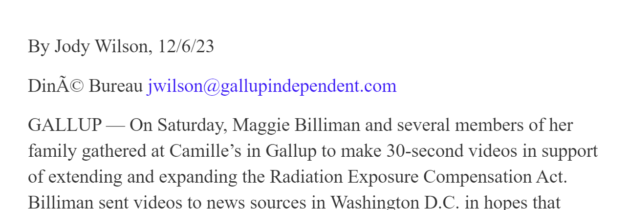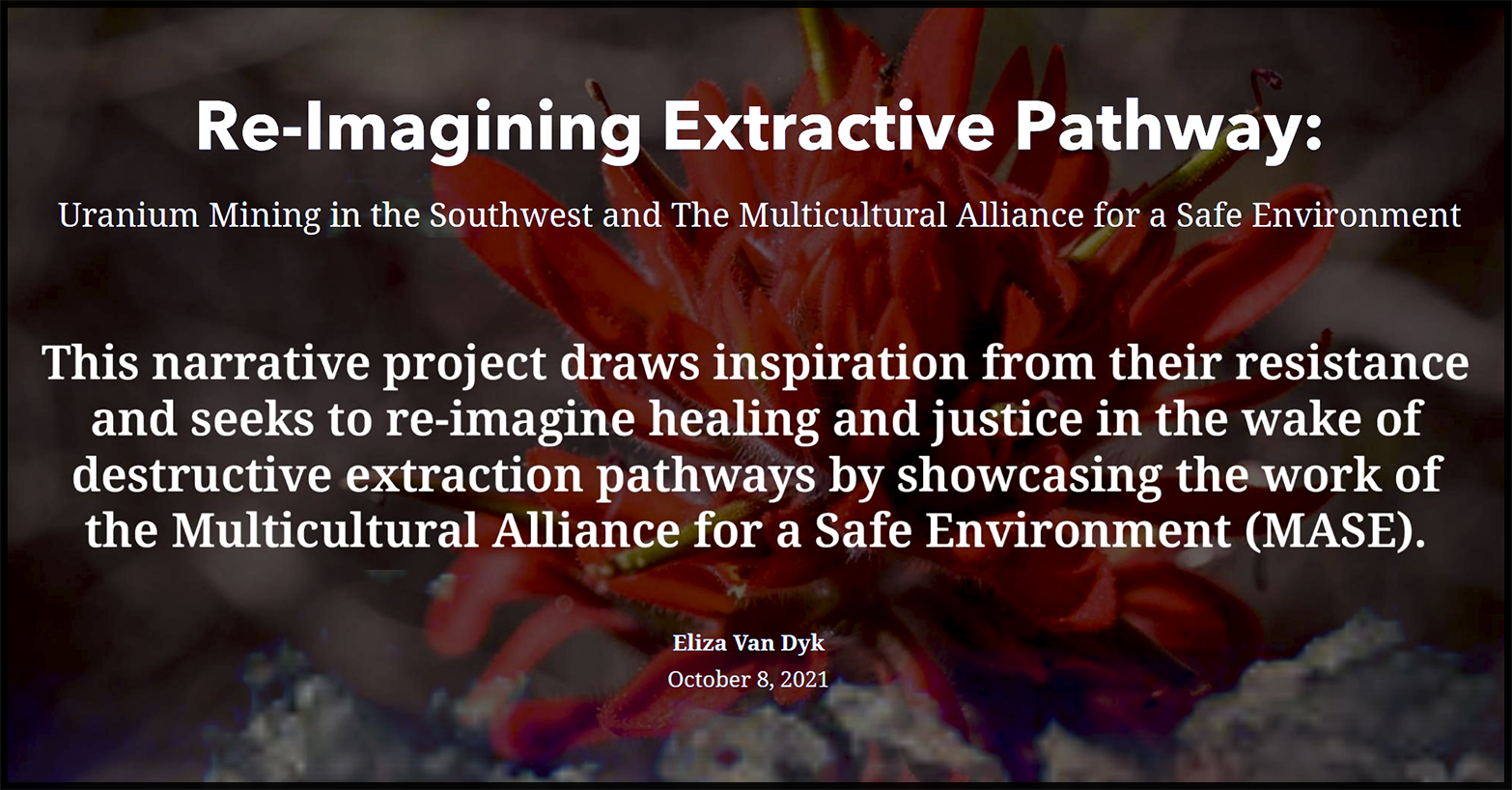Billiman raises awareness for RECA extension
By Jody Wilson, Gallup Independent | 12/6/23 Diné Bureau
GALLUP — On Saturday, Maggie Billiman and several members of her family gathered at Camille’s in Gallup to make 30-second videos in support of extending and expanding the Radiation Exposure Compensation Act. Billiman sent videos to news sources in Washington D.C. in hopes that members of Congress will see it and vote in favor of a RECA extension.
The Radiation Exposure Compensation Act is a law that was passed in 1990 to provide compensation to individuals affected by nuclear testing and uranium mining. The legislation is set to expire in July 2024.
Over the summer, the U.S. Senate passed a bill as an amendment to the National Defense Authorization Act, which is a big defense budget bill. The amendment would strengthen RECA by covering communities that were left out for many decades, it would also increase the compensation that people are eligible for. It would also extend the amount of time that people have to apply. The House passed its own version that did not include an extension of RECA.
Now, the House and the Senate are going through what’s called a conference process to try to work out the differences between their bills including RECA.
Over the past several months, Billiman has been on a mission to extend and pass RECA in the NDAA.
Billiman set up two meetings in her home community of Sawmill to raise awareness on the issue and collect signatures for petitions asking the House to expand and extend the deadline.
Billiman’s father was a Navajo Code Talker and before his death in 2001 they did not know about RECA. He asked her to research cancer treatments so that nobody else would have to endure the same hardship.
“Nobody had educated us about it. I didn’t know this was going to affect me, my whole family, my community and all the way across the reservation,” said Billiman.
‘We feel like we’re forgotten’
Her brother Daniel Billiman and sister Julia Torres are facing similar hardship.
“I’ve been dealing with the hospitals all across the reservation, Winslow, Tucson, Albuquerque – I’ve been there. They never told me what the cause of it was. I still carry that problem that I have with my health,” said Daniel. “It brings tears in my eyes when I see the elders suffer even now the younger ages are going through a lot like my own sisters, I see them in pain. All this radiation exposure is really hurting the people and community, we feel like we’re forgotten.”
Along with advocating in her community, Billiman has also reached out to elected leaders and others for help including Lilly Adams who is the Senior Outreach Coordinator for the Union of Concerned Scientists.
“Unfortunately, I talked to so many people who have similar stories to Maggie, where so many people in their families and communities have been exposed and have gotten cancer or passed away from cancer and are also experiencing those health issues themselves,” said Adams. “We’ve been working very hard to try to maintain RECA throughout this process to make sure that is in the fi nal defense budget bill that passes.”
“I think this is important because the U.S. government essentially poisoned its own people through the process of above-ground weapons testing and uranium mining and production. People are now suffering from cancer and other illnesses and government has a responsibility to help those people,” said Adams.
Billiman has also reached out to Senate Minority Leader Mitch McConnell and House Speaker Mike Johnson. She and Adams also had a meeting with Congressman Eli Crane’s Offi ce, which yielded good results.
“Congressman Crane ended up writing a letter of support of RECA, to be kept in the NDAA, which was really powerful, and we’ve heard this has been really infl uential as well,” said Adams. Adams urges anyone who thinks they might be affected to learn more about the program because there are resources to help. For others interested in helping to expand the program, she said the best thing to do is to contact their member of Congress.
Billiman said despite her health issues, she is going to continue to advocate for RECA.
“I really wanted to be a voice for the Navajo people and I know that a lot of them don’t quite understand a lot of things,” said Billiman. “I really do hope that they extend RECA because besides the money, we need better healthcare. I’m going to fight until my last breath.”






